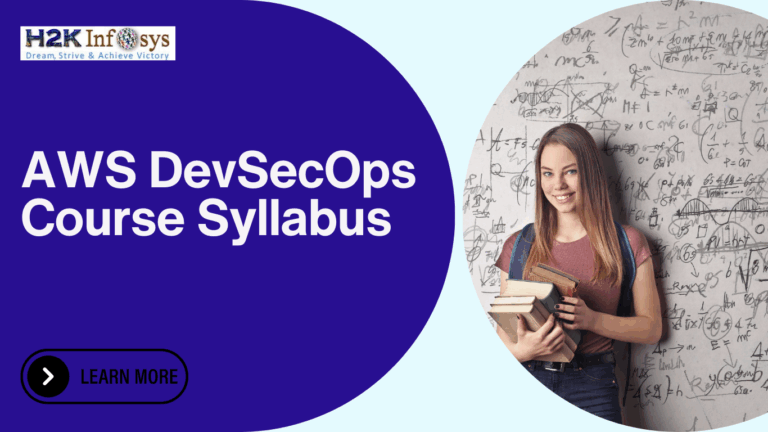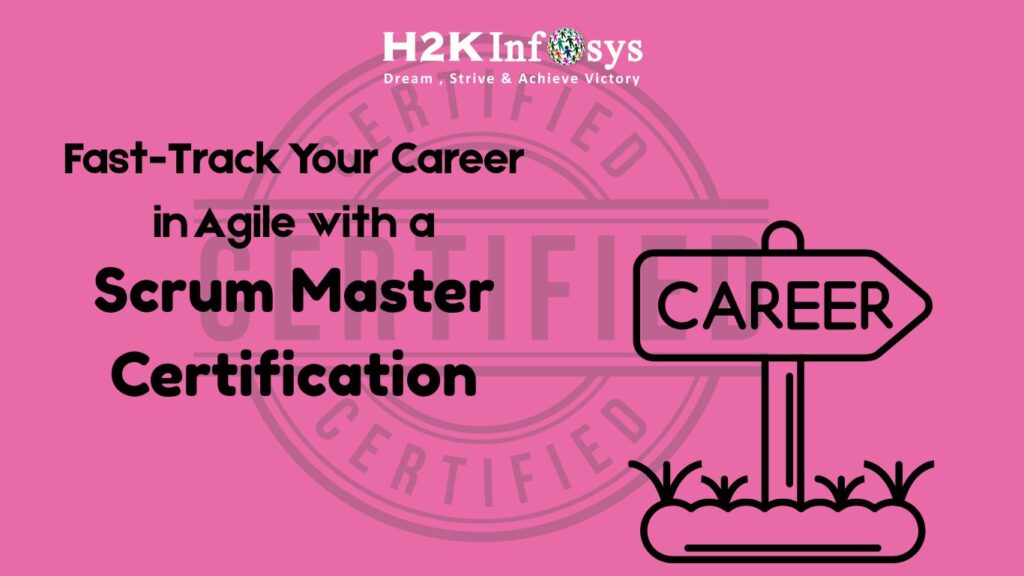Introduction
Modern software development demands speed, reliability, and strong security practices. That’s where DevSecOps, short for Development, Security, and Operations, comes into play. It brings security into every step of the DevOps workflow, ensuring safer, more resilient applications. If you’re thinking about enrolling in a DevSecOps course or pursuing DevSecOps certification, it’s helpful to know exactly what the training covers. In this blog post, we’ll break down the AWS DevSecOps course syllabus and give you a clear picture of what you’ll learn along the way.
The demand for professionals with expertise in DevSecOps has surged across industries. According to a 2024 report by Cybersecurity Ventures, the global DevSecOps market is projected to grow by over 25% annually through 2027. Companies are increasingly embedding security controls into the CI/CD pipeline, leading to a rise in demand for certified professionals. That makes an AWS DevSecOps course syllabus an essential learning path for modern tech professionals.
Let’s explore the comprehensive syllabus, real-world applications, tools covered, and the step-by-step learning structure you can expect.
What is Covered in an AWS DevSecOps Course Syllabus?
1. Introduction to DevSecOps Concepts
- What is DevSecOps?
- Evolution from DevOps to DevSecOps
- Importance of security in DevOps workflows
- Key principles of DevSecOps
- Benefits of integrating security early in the pipeline
You’ll begin with understanding the core of DevSecOps, the cultural shift, and how security transforms from a bottleneck to an enabler. This foundational module also introduces how the AWS DevSecOps course syllabus ties into secure application development and deployment.
2. DevSecOps Architecture and Methodology
- CI/CD pipelines and their vulnerabilities
- DevSecOps lifecycle stages
- Secure SDLC (Software Development Life Cycle)
- Threat modeling in DevSecOps
Understanding the framework is essential. This module guides you through setting up a secure architecture using CI/CD principles. The AWS DevSecOps course syllabus focuses heavily on the integration of security checkpoints at each stage of the development pipeline.
3. AWS Cloud and DevSecOps Fundamentals
- Overview of AWS cloud infrastructure
- Shared responsibility model
- Identity and Access Management (IAM)
- AWS security tools overview (e.g., GuardDuty, AWS WAF, Inspector, CloudTrail)
With AWS being a key platform for enterprise cloud computing, this section of the AWS DevSecOps course syllabus ensures you understand the specific tools and services that make cloud-native DevSecOps feasible. IAM plays a vital role in implementing least-privilege access.
4. Version Control and GitOps Security
- Introduction to Git
- Branching strategies
- GitOps principles and DevSecOps
- Secure Git workflows
- Secrets management in Git repositories
This hands-on section of the AWS DevSecOps course syllabus teaches how to maintain secure version control processes. Tools like HashiCorp Vault, SOPS, and Git hooks are covered with real-world examples.
5. CI/CD Pipeline Security
- Jenkins/Bamboo/GitLab CI/CD security practices
- Secure build, test, and deployment stages
- Signing and verification of artifacts
- Managing pipeline secrets securely
DevSecOps integrates security directly into the CI/CD pipeline. The AWS DevSecOps course syllabus includes tutorials on configuring Jenkins with role-based access, integrating SAST and DAST tools, and managing secrets using AWS Secrets Manager.
6. Infrastructure as Code (IaC) and Security
- Introduction to Terraform and AWS CloudFormation
- Risks associated with IaC
- Securing IaC templates
- Scanning tools: Checkov, tfsec
IaC allows for automation, but it can also introduce misconfigurations. This part of the AWS DevSecOps course syllabus helps learners scan and secure IaC templates before deployment. Learners get practical experience configuring security guardrails in IaC tools.
7. Static and Dynamic Application Security Testing (SAST & DAST)
- Introduction to SAST tools: SonarQube, CodeQL
- Introduction to DAST tools: OWASP ZAP, Burp Suite
- How to integrate testing into pipelines
- Automating SAST/DAST scans in CI/CD
Application-level security testing is a core skill. This section of the AWS DevSecOps course syllabus walks you through configuring automated scans in real-time builds. You’ll learn how to interpret findings and apply remediation.
8. Container Security and Orchestration (Docker & Kubernetes)
- Docker image security best practices
- Image scanning tools: Trivy, Clair
- Kubernetes security fundamentals
- RBAC in Kubernetes
- Pod Security Policies and network segmentation
Containerization is central to DevOps. The AWS DevSecOps course syllabus dives deep into container security, including container runtime protection and Kubernetes hardening. Students deploy and secure microservices on Amazon EKS.
9. Cloud-Native Security with AWS Services
- AWS-specific security practices
- Configuring AWS WAF and Shield
- GuardDuty and Security Hub
- Compliance and auditing with CloudTrail and Config
This section of the AWS DevSecOps course syllabus is tailored to AWS-native services and how they strengthen cloud posture. Real-life case studies demonstrate how companies use these services for threat detection and response.
10. Secrets Management
- Managing secrets using AWS Secrets Manager
- Integrating secrets in pipelines
- HashiCorp Vault setup and usage
Secrets such as API tokens and passwords are often mishandled. This module in the AWS DevSecOps course syllabus provides step-by-step guidance on managing secrets securely, rotating them automatically, and controlling access through IAM policies.
11. Monitoring, Logging, and Alerting
- Introduction to logging tools (CloudWatch, ELK Stack)
- Setting up centralized logging
- Real-time alerting with AWS SNS and CloudWatch Alarms
- Log retention and compliance requirements
This part of the AWS DevSecOps course syllabus emphasizes the importance of observability in cloud environments. Learners gain skills to detect anomalies and trigger alerts for suspicious activity.
12. Compliance and Governance
- Industry compliance standards: GDPR, HIPAA, PCI-DSS
- Implementing compliance as code
- Auditing and reporting with AWS Config
Security isn’t just about tools; it’s also about meeting regulatory requirements. This section ensures learners understand how to map security practices to compliance requirements within AWS DevSecOps environments.
13. Incident Response and Threat Hunting
- Defining incident response plans
- Using GuardDuty for threat detection
- Forensic analysis and data integrity
- Real-world incident case studies
The AWS DevSecOps course syllabus includes simulations where learners respond to security incidents and perform root cause analysis. This prepares them to act decisively in high-pressure environments.
14. Capstone Project: End-to-End DevSecOps Implementation
- Designing a secure CI/CD pipeline from scratch
- Integrating SAST, DAST, IaC scanning
- Automating compliance and reporting
- Deploying to a Kubernetes cluster on AWS
As the final module, this section allows learners to demonstrate everything they’ve learned. The capstone project aligns with the AWS DevSecOps course syllabus and serves as a portfolio piece for job interviews.
Real-World Applications of the AWS DevSecOps Course Syllabus
The practical nature of the AWS DevSecOps course syllabus ensures learners are thoroughly prepared to meet real-world job demands from day one. Each module is carefully aligned with hands-on responsibilities, allowing professionals to confidently step into key security roles within modern DevOps environments. Let’s take a closer look at how the skills gained from the AWS DevSecOps course syllabus translate into actual job roles in the tech industry:
- DevSecOps Engineer: Graduates of the course are well-equipped to automate and continuously monitor secure CI/CD pipelines. This means not only writing scripts but also implementing tools that verify code security and compliance at every stage of development. Their role involves orchestrating an end-to-end security approach that seamlessly fits into agile and DevOps workflows.
- Cloud Security Analyst: The knowledge gained through the course enables professionals to audit and enforce AWS security policies with confidence. This includes understanding IAM roles, managing permissions, identifying misconfigurations, and ensuring that cloud-native applications operate within a secure framework that adheres to both organizational and regulatory standards.
- Infrastructure Engineer: A key aspect of the AWS DevSecOps course syllabus is teaching learners how to write secure Infrastructure as Code (IaC). This ensures infrastructure is built with security best practices baked in from the start. Additionally, managing Kubernetes clusters becomes second nature, enabling engineers to maintain containerized applications securely at scale.
- Application Security Specialist: The course also provides the expertise needed to integrate various security testing tools directly into the development process. Professionals in this role are trained to identify, triage, and manage vulnerabilities effectively, ensuring that applications remain secure from development through deployment and beyond.
In each of these roles, familiarity with tools like AWS WAF, GuardDuty, CodePipeline, and Terraform is essential. The syllabus prepares you to work hands-on in a production environment.
Benefits of Learning from the AWS DevSecOps Course Syllabus
Builds a security-first mindset in DevOps workflows
One of the primary advantages of following the AWS DevSecOps course syllabus is that it instills a security-first approach within every stage of the DevOps pipeline. Instead of treating security as an afterthought, learners are trained to integrate security considerations right from the planning and development phases, leading to more robust and compliant software systems.
Enhances your profile for DevSecOps certification exams
The syllabus is meticulously designed to align with the key domains and objectives of major DevSecOps certification exams. By covering essential topics and best practices, it helps learners build the theoretical and practical foundation necessary to confidently attempt and pass industry-recognized certification exams in the DevSecOps space.
Ensures you are familiar with the latest AWS security tools
With cloud security evolving rapidly, staying current with AWS’s latest tools and services is crucial. The syllabus ensures that you gain hands-on experience and working knowledge of the most up-to-date AWS security tools, such as AWS Identity and Access Management (IAM), AWS Config, AWS Inspector, and others, so you can apply them effectively in real-world cloud environments.
Prepares you for real-time security implementation
Beyond just theory, the AWS DevSecOps course syllabus is structured to provide practical exposure to real-time scenarios. This means you’ll not only understand security principles but also learn how to implement them in continuous integration and continuous deployment (CI/CD) pipelines, using tools and techniques that mirror actual industry use cases.
Develops cross-functional expertise in DevOps, cloud, and cybersecurity
The syllabus does more than just focus on a single domain; it integrates knowledge from DevOps processes, cloud infrastructure management, and cybersecurity strategies. This holistic training helps you develop cross-functional expertise, making you a well-rounded professional capable of bridging the gap between development, operations, and security teams.
With the growing importance of secure software delivery, the AWS DevSecOps course syllabus prepares professionals to meet industry expectations and lead innovation in cloud security.
Conclusion
The AWS DevSecOps course syllabus offers a structured, comprehensive pathway to mastering modern secure software development. Whether you’re aiming for a role in DevSecOps, cloud security, or AWS architecture, this training provides the skills and knowledge to excel. The integrated hands-on learning, real-world tools, and security-focused mindset make it a valuable investment.
If you’re serious about boosting your skills, start with a DevSecOps course and consider pursuing DevSecOps certification to validate your expertise.
Take the next step and invest in your cloud security future today. Starts with the right training and the right syllabus.

























